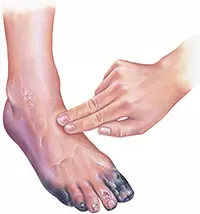- Home
- Medical news & Guidelines
- Anesthesiology
- Cardiology and CTVS
- Critical Care
- Dentistry
- Dermatology
- Diabetes and Endocrinology
- ENT
- Gastroenterology
- Medicine
- Nephrology
- Neurology
- Obstretics-Gynaecology
- Oncology
- Ophthalmology
- Orthopaedics
- Pediatrics-Neonatology
- Psychiatry
- Pulmonology
- Radiology
- Surgery
- Urology
- Laboratory Medicine
- Diet
- Nursing
- Paramedical
- Physiotherapy
- Health news
- Fact Check
- Bone Health Fact Check
- Brain Health Fact Check
- Cancer Related Fact Check
- Child Care Fact Check
- Dental and oral health fact check
- Diabetes and metabolic health fact check
- Diet and Nutrition Fact Check
- Eye and ENT Care Fact Check
- Fitness fact check
- Gut health fact check
- Heart health fact check
- Kidney health fact check
- Medical education fact check
- Men's health fact check
- Respiratory fact check
- Skin and hair care fact check
- Vaccine and Immunization fact check
- Women's health fact check
- AYUSH
- State News
- Andaman and Nicobar Islands
- Andhra Pradesh
- Arunachal Pradesh
- Assam
- Bihar
- Chandigarh
- Chattisgarh
- Dadra and Nagar Haveli
- Daman and Diu
- Delhi
- Goa
- Gujarat
- Haryana
- Himachal Pradesh
- Jammu & Kashmir
- Jharkhand
- Karnataka
- Kerala
- Ladakh
- Lakshadweep
- Madhya Pradesh
- Maharashtra
- Manipur
- Meghalaya
- Mizoram
- Nagaland
- Odisha
- Puducherry
- Punjab
- Rajasthan
- Sikkim
- Tamil Nadu
- Telangana
- Tripura
- Uttar Pradesh
- Uttrakhand
- West Bengal
- Medical Education
- Industry
Bypass surgery better than endovascular treatment in chronic limb-threatening Ischemia

A recent study published in the European Journal of Vascular & Endovascular Surgery suggests Bypass surgery shows better outcomes with some post-op complications than percutaneous transluminal angioplasty with/without stenting (PTA/S)in Chronic Limb Threatening Ischemia (CLTI) patients with long (GLASS grade III and IV) femoropopliteal disease.
Intermittent claudication is usually treated conservatively. However, if conservative treatment fails and the patient is strongly disabled, invasive treatment can be considered. Percutaneous transluminal angioplasty (PTA) or bypass surgery are the possible treatment options for patients with chronic limb-threatening Ischemia. A decision-analysis, based on the results of cohort studies, advised PTA for stenosis or short occlusions, whereas vein bypass surgery was recommended for long occlusions. However, this recommendation was based on heterogeneous patient groups and the optimal method of treatment remains controversial. For this purpose researchers of Clinic for Vascular & Endovascular surgery, Serbia conducted a study to compare short and long term outcomes between PTA/S and OSB in CLTI patients with long (GLASS grade III and IV) femoropopliteal disease.
It was a two-centre retrospective study including all consecutive patients with CLTI undergoing first time lower extremity intervention at two distinct vascular surgical centres between 1 January 2012 and 1 January 2018. A total of 1545 CLTI consecutive limbs were treated for femoropopliteal GLASS grade III and IV lesions at two vascular surgical centres and among which some patients were randomly assigned to either OSB (n=235) or PTA/S (n=235). Researchers calculated the propensity score for each limb using covariables from baseline and angiographic characteristics. The major outcome analyzed were freedom from re-intervention in the treated extremity and major amputation. Researchers also analyzed all hospital complications among the two patient groups.
After treatment, the researchers found overall complication rates were significantly higher in the OSB group (20.42%) than in PTA/S group (5.96%). They also observed, wound infection/seroma rate that required prolonged hospitalisation and further treatment were require in patients of OSB group (7.65%) whereas it was absent in PTA/S group (0%). However, after the median follow-up of 61 months, they found re-intervention rates were significantly higher in the PTA/S group (log-rank test, 44.68% than in PTA/S group (29.79%). They also found no significant difference in major amputation rates between the two group of patients (PTA/S 27.23% vs. OSB 22.13%)
The authors concluded, "Bypass surgery seems to be superior to PTA/S for GLASS grade III and IV femoropopliteal lesions in patients with CLTI in terms of long term re-intervention rates, but with considerably higher rates of post-operative complications".
They further added, "A larger cohort of patients in currently ongoing randomised trials, as well as prospective cohort studies are necessary to confirm these findings".
For further information:
https://www.ejves.com/article/S1078-5884(20)31002-9/fulltext?rss=yes#%20
Medical Dialogues Bureau consists of a team of passionate medical/scientific writers, led by doctors and healthcare researchers. Our team efforts to bring you updated and timely news about the important happenings of the medical and healthcare sector. Our editorial team can be reached at editorial@medicaldialogues.in.
Dr Kamal Kant Kohli-MBBS, DTCD- a chest specialist with more than 30 years of practice and a flair for writing clinical articles, Dr Kamal Kant Kohli joined Medical Dialogues as a Chief Editor of Medical News. Besides writing articles, as an editor, he proofreads and verifies all the medical content published on Medical Dialogues including those coming from journals, studies,medical conferences,guidelines etc. Email: drkohli@medicaldialogues.in. Contact no. 011-43720751


